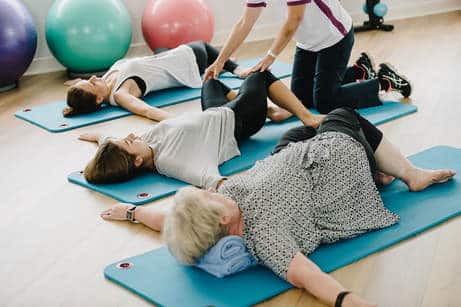February Newsletter

The benefits of physiotherapy in the treatment of Jaw pain and TMJ
Jaw pain and TMJ can occur due to issues with the associated muscles, ligaments and nerve supply. Common issues in patients who have jaw pain include bruxism (clenching), pain with yawning, pain with chewing food, clicking and a “locked” feeling. Jaw pain can either occur from an injury, such as a direct blow to the jaw, or more commonly it gradually occurs over time. Up to 70% of the population will experience jaw pain to some extent, with the most common demographic being females between the ages of 20 and 40.
Patients are often surprised to learn that physiotherapists can treat jaw pain. The jaw, like any other body region, consists of joints, muscles, ligaments, tendons and nerves and can cause people issues such as pain and reduced function. Physiotherapists are skilled professionals who help to restore physical function and the jaw is not exempt. Some of our techniques may require internal access to the jaw and we therefore use gloves for these techniques (as if you were going to the dentist!).
Speaking of dentists, we will commonly liaise with your dentist as they can also assist in managing jaw pain. Sometimes there will be reasons for jaw pain that are outside our scope of practice, such as tooth infections. Dentists can also assist in prescribing night splints for clenching, which can help to reduce tooth erosion and help control jaw pain.
As well as treating the jaw, we may also assess and treat the neck in patients with jaw pain. The upper part of the neck shares a common nerve innervation with the jaw, and this nerve can also be responsible for symptoms such as headaches and dizziness. It is not uncommon for patients with jaw pain to also have these symptoms. If you are currently experiencing jaw pain, contact the clinic today to book an appointment with one of our physiotherapists who treat jaw pain!
Our new 2021 class timetable is out now
✅ Bone Loading Classes. Monday 12 noon and Thursday at 1pm.
✅ Posture & Strength Classes. Monday & Wednesdays at 9am & 10am.
✅ Mobility & Balance Classes. Monday at 11am. Tuesday at 9am & 11am, Thursday at 9am.
✅ Clinical Exercise Classes. Tuesday at 10am and Wednesday at 6pm.
✅ Post Natal Classes. Tuesday at 1pm. Ante Natal Classes. Tuesday at 6pm.
✅ Yoga Classes. Friday at 9am.
To find out more about our classes or to book in please call 3278 1186.


Clinical exercise classes: Tuesday at 10am with Meg / Wednesday at 6pm with Joni
If you are injury prone, feel stiff and tight and / or suffer aches and pains, our classes may help! Each exercise can be modified specifically to you and the level you are at. If you are recovering from an injury the exercises can be altered to suit your stage of rehabilitation. Our next block of clinical exercise classes start this month! 10 week class pack $450.
